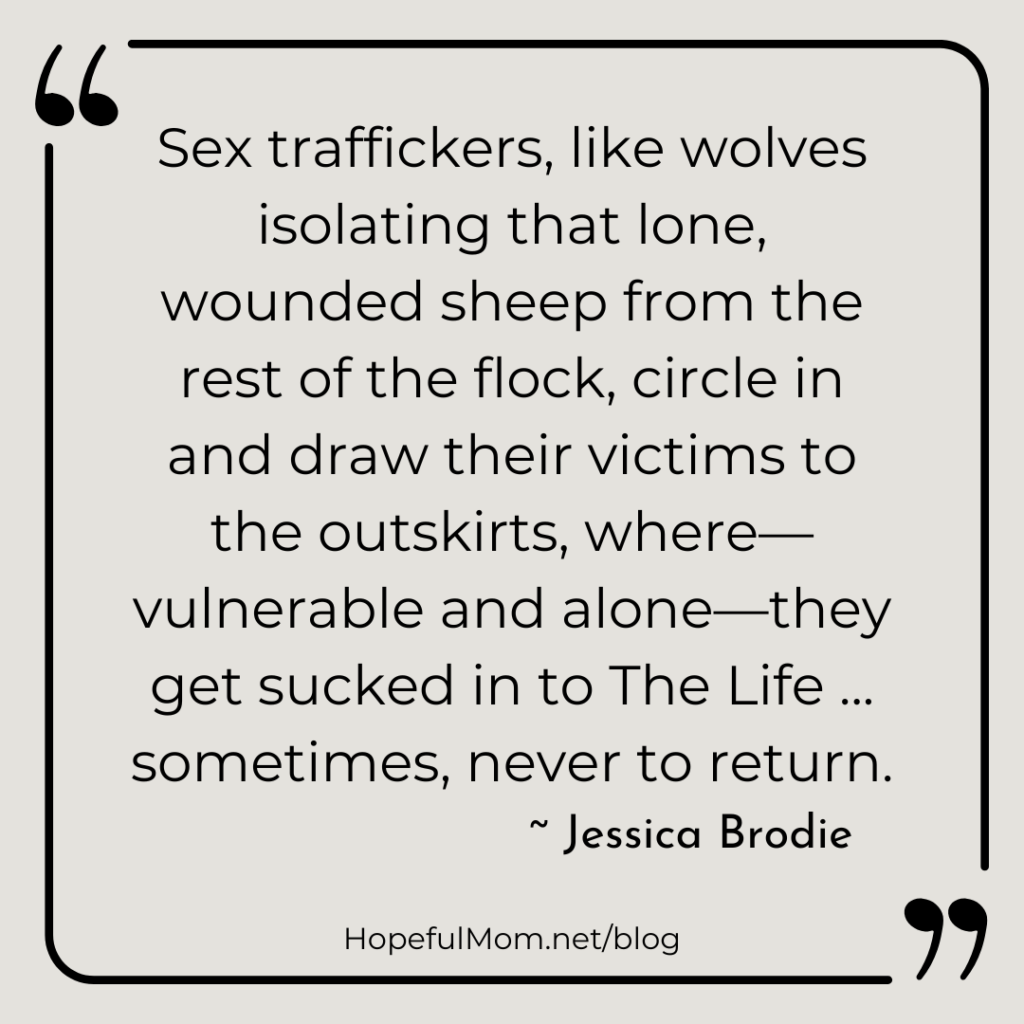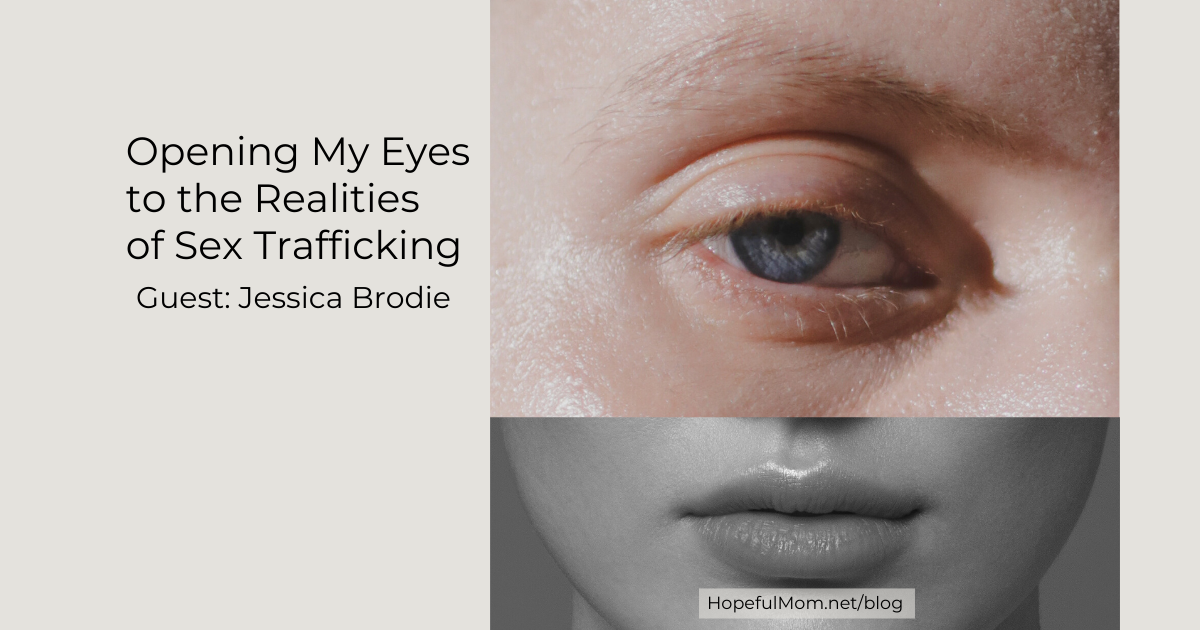January is Human Trafficking Awareness month. I met Jessica Brodie last fall and learned of her passion to educate others about the sex trafficking issue plaguing our society. Jessica offers insight and wisdom to us in her post.
Like many people, I used to make a lot of assumptions about sex trafficking—I assumed it only happened in “those” neighborhoods or to “those” kinds of kids—girls who didn’t know better, or whose moms were in the sex industry. I assumed the girls knew what they were getting into and simply made a choice—a bad one, but one they made with eyes wide open.
Then it hit close to home, when I learned about a young girl in our relatively wholesome community who’d somehow gotten lured into this mess. By the time her parents were able to track her down, out of state and by then deep in the throes of addiction and crime, she’d become a shell of her former self. It took years to heal from the trauma, and I suspect the nightmares will haunt her for a lifetime.
That’s when I learned about grooming and online chat rooms, about drug parties and quick-cash home movies, about blackmail and other sneaky, perverse, calculating tactics employed by both men and women. I learned how easily twisted, manipulative adults posing as teenaged boys or new and enticing female “friends” are able to lure young girls in with fine-tuned bait, appealing to their darkest or most desperate desires.
Like wolves isolating that lone, wounded sheep from the rest of the flock, they circle in on these girls and draw them to the outskirts, where—vulnerable and alone—they get sucked in to The Life … sometimes, never to return.

For just like victims of domestic violence are brainwashed and gaslighted by people they love and trust, so too are victims of sex trafficking.
My eyes are open now, and I can’t unsee what I now know.
The reality is that sex trafficking is everywhere. It’s in your neighborhood and mine. And it’s up to us as parents to open our eyes and do something. Raise awareness. Educate. Advocate … before it’s too late.
I have four teens, including two seventeen-year-old daughters, and rest assured I’ve had these conversations with them. Even though it makes them uncomfortable to think about, it’s critical they know not every guy on Snapchat or Instagram with a cute profile picture is actually their age. It’s critical they know how easily it can happen.
The Deliver Fund, a nonprofit intelligence agency that combats sex and other human trafficking with counterterrorism expertise, estimates that between 15,000 and 50,000 women and children are forced into sexual slavery in the United States every year. Most are female, though males are trafficked, too, for the same reasons.
And because so much of sex trafficking happens behind closed doors, in secret, it’s hard to gather accurate statistics.
In fact, according to the Polaris Project, many people in sex trafficking situations don’t even recognize themselves as “victims” because they’ve been so expertly groomed by a trafficker.
Many victims of sex trafficking don't recognize themselves as victims because they've been so expertly groomed. Read more here. #humantraffickingawareness Opening My Eyes to the Realities of Sex Trafficking Share on XAs one survivor of trafficking stated on Polaris Project’s website, “It took me ten years to realize: Hey. Wow. I was trafficked, because my situation was so different from what I had seen represented as trafficking.”
Sex trafficking can look like a lot of different things, but ultimately it involves selling one’s body for sexual acts. It can include prostitution for a pimp on the streets; gang requirements or initiation; group housing arrangements, where a homeless teen might get a place to live in exchange for sexual favors; and drugs-for-sex swaps, when someone gets free drugs for a while, then once they’re addicted, they must exchange sex acts for the drugs they now crave. In some cases, young women eager to land modeling jobs might be told they need to “be nice” to clients in order to land a coveted photo shoot—only, the agent isn’t reputable, and those photo shoots never come.
And it’s all happening all over the place, in big cities and suburbs, in farming communities and low-income projects, right under our noses with our daughters, and sometimes our sons.
Predators are out there, just looking for a foothold. Waiting for that kid who’s mad at her parents and itching for payback. Waiting for that kid who’s curious about drugs and doesn’t suspect ulterior motives when offered free samples for weeks on end.
The advent of smartphones, social media apps, and light parental restriction makes their job all the easier.
What can you do?
- Get educated. The Polaris Project has some excellent example scenarios of sex trafficking here so you can understand how easily it can happen.
- Keep lines of communication open with your kids starting at a young age. I’ve been talking about sex with my kids since they were too young to be embarrassed about it—both good, God-designed sex (in a loving, married relationship) and bad.
- Don’t stop talking when they get older and start to get embarrassed. I’d much prefer my kids find out scary facts or truths from me than from their friends or the internet. That way we can talk about it. Share news stories, or ask questions when you hear about things happening in your community. Shine light into the darkness.
- Monitor their phones, tablet, or laptops. Make sure you know what social media apps they’re on, and don’t just offer blanket approval when they ask to download something.
- Share what you know wherever you can. I’m a journalist and an author, so I use my platforms to speak out when I can, whether it’s the blog you’re reading today, an article I wrote that might appear in a newspaper or online magazine, or a novel. My faith-based novel Hidden Seeds (not yet published, but coming soon) features a protagonist who has escaped a life of sex trafficking and is starting over with her young daughter under a new name. Whether it’s your church, home, workplace, or community, consider how you can share what you know so all may see the light.
Too many times, we assume bad things happen in places far from us, that we’ve built an ironclad home and family unit that couldn’t possibly fall to attack. But as the Bible tells us, “Your enemy the devil prowls around like a roaring lion looking for someone to devour” (1 Peter 5:8 NIV). There’s no room for ignorance or wishful thinking when it comes to defending ourselves and our young people against evil.
Thanks for reading. Please spread the word about human trafficking by sharing this post.
About the author

Jessica Brodie
Jessica Brodie is an award-winning Christian novelist, journalist, editor, blogger, and writing coach. Find her debut novel, The Memory Garden, on Amazon and wherever books are sold. She is also the editor of the South Carolina United Methodist Advocate, the oldest newspaper in Methodism. Learn more about Jessica’s writing and ministry and read her faith blog at http://jessicabrodie.com. She has a weekly YouTube devotional and podcast. You can also connect with her on Facebook, Twitter, and more. She’s also produced a free eBook, A God-Centered Life: 10 Faith-Based Practices When You’re Feeling Anxious, Grumpy, or Stressed.



It is such a horrible situation. We have seen it first hand in Nepal and India. I pray more people open their eyes to such terrible circumstances and take a stand. Thanks Jessica.
Agreed. Global issue. Thanks for reading.
Amen. Thanks, Yvonne! Sometimes it just takes our eyes being opened for a change to begin.
Thank you for sharing about these horrific happenings in the world. Boys, girls, men, and women have all been trafficked. There is no age limit or gender preference. Some of the biggest world events are known to have high trafficking statistics. It’s happening in rich and poor neighborhoods. I pray God will guide us to make informed choices and ways to help those affected.
Melissa – Thanks for sharing your thoughts. Yes, it is horrific. The Super Bowl is one such event that you referred to. And this is the fastest growing criminal industry in the world, so we need to act on it. Helping others understand the dangers and educating our children will help deter this activity in the future. Praying alongside you.
So much truth here. Thank you, Melissa, for your heart for those affected! I pray the same.
Thank you for raising awareness about the evil of sex trafficking and how easily traffickers can groom, gaslight, and ensnare vulnerable people. This message is critical. Lord, have mercy.
Grateful to be part of the solution. Grateful to Jessica for her timely message. Thanks for reading.
Thank you for this blunt and educational message on this horrid and sad reality. I also used to be naive about who and where and the kind of “reach” out there. It’s scary and we need to take action. Where I work, we are very involved in supporting Love146 and Amirah.
Karen, Thanks for reading and commenting. I love that you are “doing something.” I have heard of Love146 and love their videos. I’ll have to check out Amirah.